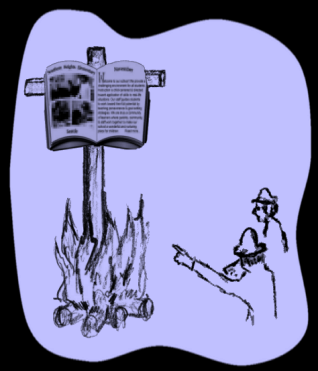“In India, as elsewhere in our darkening world, religion is the poison in the blood. Where religion intervenes, mere innocence is no excuse. Yet we go on skating around this issue, speaking of religion in the fashionable language of “respect”.” – Salman Rushdie
“Where one burns books, one will soon burn people.” – Heinrich Heine
You may have heard that some Christians have a thing against Harry Potter. Rev. John Hagee, the famous pastor from San Antonio, Texas, devoted several of his shows to battling “the great evil of Harry Potter”, as part of his war against so-called witchcraft.
Certain Christians find the justification they need for such a battle in the New Testament:
“Now the Spirit speaketh expressly, that in the latter times some shall depart from the faith, giving heed to seducing spirits, and doctrines of devils; Speaking lies in hypocrisy; having their conscience seared with a hot iron;” (1 Timothy, chapter 4, verses 1-2)
Whether Harry Potter encourages kids to delve into witchcraft (as claimed by some parent organizations across the US) is yet to be seen. One should wonder what is witchcraft anyway – not too many parents seem to ban Snow White and the Seven Dwarfs, though similar reasoning may apply in this case. Does it sound too absurd? Not if you ask Rev. George Bender of the Harvest Assembly of God Church. On March 2001, the congregation gathered around a bonfire in Pittsburgh, Pennsylvania and burned Harry Potter books, together with Disney videos such as Pinocchio, some rock CDs and literature from other religions. The act was naturally justified as based on the Bible.
In various states in the US (especially in the south) there is a history of book banning. All over the world many Orthodox Jews have banned the New Testament itself. In recent years the issue of Harry Potter has appeared in several Jewish discussions because a central part of Judaism is the 613 Mitzvot (613 commandments) derived from the Bible, of which the 62nd one reads: “Thou shalt not suffer a sorceress to live” (Exodus, chapter 22, verse 17).
Burning witches in the past millennium was more of a Christian business. Yet, burning printed material and destroying other precious things – in the name of religion – has been the business of others as well. Islamic revolutions, such as the one in Sudan during the late 80s, experienced breaking and destroying many bottles of wine and other forbidden alcoholic beverages. The destruction of the huge stone Buddhas by the Taliban in Afghanistan in 2001 shook the civilized world. The famous Egyptian Sphinx escaped a similar Fatwah (a religious edict) in the beginning of 2006. The Satanic Verses, a famous book by Salman Rushdie, was for Iran’s Ayatollah Khomeini much more than what Harry Potter has been for Rev. John Hagee. In 1989, the now deceased leader of Iran declared that the book was blasphemous, and called for the death of Mr. Rushdie. Salman Rushdie went into hiding, with the protection of the British government. A million dollar reward was offered for Rushdie’s murder, and worldwide, many people associated with the book’s publishing were physically attacked.

It seems that some religious leaders are eager to limit the possibilities for the flock under their care to even know of other things, whether factual or fictitious. Not knowing seems to be a major part of not believing. Is religious belief so fragile that it needs to be nurtured all the time?
The issue is even deeper – it’s related again to the sensitive matter of believing vs. knowing. If people knew (scientifically speaking) about a God above who enjoyed our doing certain things, then there wouldn’t be any real reason to prevent them from reading opposing literature and opinions. Hence the very existence of the thought police is the best indication for the need for its existence. Guard and protect – this is one of religion’s self-defense mechanisms.
Orthodox Judaism generally forbids causing any harm to written religious texts. A hand-written official Bible even gets a proper burial ceremony if damaged. Yet, there seems to be a good excuse for anything when it’s arbitrarily deemed necessary. For example: When written by a heretic, the book should to be burned.
In the year 2000, a small Israeli organization named Daat Emet (Knowing the Truth) compiled and distributed interesting pamphlets among ultra-Orthodox Jewish communities in Israel. Most of the content of those pamphlets consisted of actual quotes from traditional Jewish religious literature, such as the Talmud, and even the Bible. However, the material was well organized in a way that demonstrated numerous contradictions and factual errors in the ancient texts.
The people who compiled the pamphlets obviously had a background in Judaism. Their purpose in creating the pamphlets was simple: Encourage people to raise doubts and be able to criticize, while talking their own language, using the very same texts that are studied on a day-to-day basis.
The response to the pamphlets was in many instances quite extreme and varied from public slander to actual violence. In several cases, the pamphlets were gathered and burned in public. Needless to say, in privacy many religious people did read the forbidden material, just as many of John Hagee’s followers probably read Harry Potter and many Iranians read Salman Rushdie.
With a bit of luck, this book will be banned as well.
<< Prev Contents Next >>






